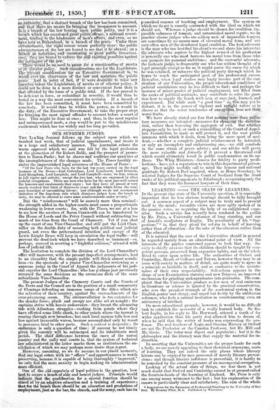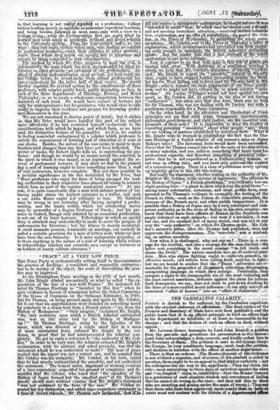LEARNING versus THE SE.A_TS OF LEARNING.
liv the present ripe state of the University question, it is especially important that its less obvious bearings should be fully brought out. A common aspect of a subject may be truly said to present itself to the mind ; recondite views are more aptly spoken of in the passive voice, as requiring the help of an enlightened expo- sitor. Such a service has recently been rendered to the public by Mr. Price, a University reformer of long standing, and one of Arnold's coadjutors at Rugby. The peculiarity of his " Sug- gestions" • is, that they plead for reform in behalf of learning rather than of education—for the sake of the educators rather than of the educated.
It is natural that the case of the Universities should in general be regarded mainly from an educational point of view. All the interests of the parties concerned appear to look that way. So- ciety is chiefly anxious that its children should be taught by com- petent persons, preserved from expensive habits, and on the whole fitted to enter upon active life. The authorities of Oxford and Cambridge, Heads of Colleges and Tutors, however they may be at issue with society in matters of detail, are quite ready to agree
a principle so laudable in itself, and so conducive to the mainte- nance of their own respectability. Self-reform appears in the shape of new Examination statutes and new Tripo'
ees an improved mechanism for grinding undergraduates into graduates. The cone- plaint that the Universities produce so few men of real eminence in literature or science is ignored by the practical conservative., who sees the proudest triumph of the academical system in the English gentry and clergy, and urged but feebly by the utilitarian reformer, who feels a natural hesitation in countenancing even an aristocracy of intellect. On mere educational grounds, however, it would be no ffrfficidt task to establish the necessity of a really learned body. Sir Ro- bert Inglis, in his reply to Mr. Heywood, uttered a truth of far wider application than his party zeal allowed him to dream of, when he said that the writer of books was superseding the pro- fessor. The real teachers of Logic and Grecian History at Oxford are not the Prmlector or the Camden Professor, but Mr. Mill and Mr. Grote. The tutor may digest and popularize ; but it it the philosopher and the literary man that supply the material • for in- strnetion.
In asserting that the -Universities are the proper locale for such a body, we are merely appealing to their rhetorical synonyme, seats of learning. They are indeed the only places where literary' leisure can be enjoyed by men possessed of merely literary preten- sions; and though literary indolence is proverbial, it is hardly to be remedied by the constant pressure of an uncongenial occupation..
Looking at the actual state of things, we fear there et not much doubt that Oxford and Cambridge cannot be at presentrailed the fountain-heads of the learning of England; Mr. Price is only one among many witnesses to the fact ; but his explanation of its causes is particularly clear and satisfactory. The sum of the whole
Suggestions for the Extension of Professorial Tiaching in the university of Ox-. ford. /5y Hominy Price, M.A. Published by Whittaker. •
is, that learning is not 41 41€11€4 as a profession; College tuition leading merel• •
1 . 1 h• ,...0•.,,,„ t superficial teaching,
and being beside ep 9; w C.tst in 4 %fitly with a view to a
CollFeLli • l 1 , • t'i i' e` ! 9 I If Pii 9/1.A ....• . • : IF
s ';' "
ilest. i,
..
9, I/NAM K"41go ;, .
A 11
*TICTO f 1 ' 1'.1 Ygii . • n ' - ,.. I • . • t I I ' I i 14 I) a 1 .:3•
I I I I •
in me - ..r. iff fit,;(11 4 .Ltar .
. . .
, PIP ■', tl.,i
-7 '1 alvffr R,' ' A ' a . ,5N 0 ,,rir3n lie
, •,. ., ,,,, , . ...• I. I .i ,1,1 1 'I ' .1•a. vlieieteir
- 11 . • fitin 1 I
. . 3 1 IP 1 .1)SPASedl " I. i tiAll Vffii4P 1 Lb. I I ' t 1 • I ' an a I 1 I, • ,1I 1 II 1 •.4.,, s
.,, • ., , ,.... ,,,,,,, ,•.,„
? "in' wine ' ' :-.
i 9 ,•- . Tlf .03
5 ' - ; , 481 ,41"TY 41A, ,;114,„ '14!. 1011IY
rJ
,•, ... 4.
,.•m .,I;,. " i
3i 1
st ,eF: . ,),, - oprive a . y d.: E 4. rp errs,_ wi 1 _galmies partly PP ' 7 , 714 ■41 eac i 0 the three departments' heolog,y, is ty, and Miri Philosophy; so as to create a wholesome competition between, . members of each triad. Ile would have cou90 of lectures lit only for undergraduates but for graduates, whOvoulil thus be sth e really to improve their residence and prep,uo for,lieeaming profes- sors themselves in due time.
Wo are not concerned te discuss points of detail; bii it strikes us that Mr. Price would have handled this part of his enlject more effectively if he had restricted himself exclusi* 'to the considerations with which he began, and whicill pat, as we 'hyp said, the distinctive feature of his pampPet;Ifucitlit, we 430re* to feeling somewhat ,embarrassed by a ise.0s1).10 ,profeefes to satisfy the requirement of learning ailll'Ofi,tiOn. as if were at one stroke. Besides,--ihe nature of the' &Lee seeiiiii f.Ofooint to more- fundamental changes than any that have yet hecaTfidicated. The writer of books, Sir Robert Inglis tells us, is superseding the pro- fessor : and though we would by no means accept the assertion in the spirit in which it was meant, as an argument against the re- vival of professorial lectures, it may show us that in the present day a seat of learning ought to have something more than a staff of oral instructors, however complete. May not there possibly be a peculiar significance in the fact mentioned by Mr. Price, that "those professors who enjoy the fame of being amongst the lead- ing authorities in their respective lines almost all belong to sciences which form no part Of the regular academical course "? At, 'in rate, it is quite conceivable that a man with inferior powers of -1` tering might attain the highest eininence's a writer, and sue a one Alma Mater ought nit willingly -to' lose. , Dr. Gaisfo may be wrong in not lecturing after haying ae0Opild'a profe. - sorship, and the limits within which his sch6laAhiP moves may be unworthy of a Regius Professor of Greek.; but his 1)re- sence in Oxford, though only attested by an occasional publieetion, is not one of its least-honours. Fellowships to which no special duty is attached may undoubtedly be made to serve the purpose of endowments for literature; but the fitness is merely accidental. A small monastic-Pension, terminable on mint*, can scarcely be oalled a suitable provision for a man of letters now, whatever may have been the case formerly. Is it mere antiquarian prejinlicb:ror is there anything in the nature of a seat of learning whichWtuses to acknowledge scholars and scientific men except as lectulths or .as holders of scanty- celibate sinecures ?
,c47
61i
i• I
T It I 1. • .• •
II



























 Previous page
Previous page